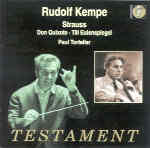Wonderful though Rudolf Kempe’s 1970s Dresden Staaskapelle recordings of Strauss’ Don Quixote and Till Eulenspiegel may be, his earlier 1958 Berlin Philharmonic versions are better. Cellist Paul Tortelier, for one, essays Don Quixote’s demanding feature solo part with a suaver bow arm plus superior tonal control and intonation next to his Dresden remake. Cases in point: the register shifts and sustained passages in Variation V (The Knight’s Vigil) and the Finale.
In the Dresden Till Eulenspeigel, Kempe shaves a minute from his 15-and-a-half Berlin timing, gaining in efficiency what he loses in characterzation and contrast. The conductor’s slower Berlin treatment of the passage marked “Immer sehr lebhaft” restores both the music’s comical underbelly as well as the tender lyricism of the B-flat major section (marked “Gemächlich”). And the Berlin Philharmonic brings more timbral diversity and dapper, chamber-like rhythmic pointing to the scurrying motives as the players pass back and forth between sections and solo instruments. Testament’s remastering uncovers more tape hiss than EMI’s previous transfers–a small price to pay for the added clarity and atmosphere at both ends of the sonic spectrum. In short, a disc no Strauss lover should miss.
































